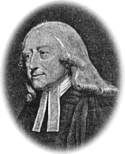World Methodist Council
The World Methodist Council (WMC), founded in 1881, is a consultative body and association of churches in the Methodist tradition. It comprises 80 member denominations in 138 countries which together represent about 80 million people.[1]

Affiliated organizations are the World Fellowship of Methodist and Uniting Churches, the Oxford-Institute of Methodist Theological Studies, the World Methodist Historical Society, World Council of Confederation of Methodist Youth, the World Council of Methodist Men, World Methodist Council of Teens, the World Federation of Methodist and Uniting Church Women and The General Commission on Archives and History.
Organization
The highest organ of the World Methodist Council is the World Methodist Conference meeting every five years. The next Conference will be in Sweden in 2021.[2]
The 21st Conference was held in 2016 in Houston, Texas in the United States. The theme was “ONE.” Organized around four sub themes – One God, One Faith, One People, One Mission.[3]
The 2011 conference, gathered under the theme "Jesus Christ - for the Healing of the Nations", was held in August 2011 in Durban, South Africa.[4] On 24 July 2006, Sunday Mbang stepped down as chairperson of the council and John Barrett took over his position as well as elected president for the council.[5]
In 2006, it formally approved the Joint Declaration on the Doctrine of Justification.
The World Methodist Council has offices in: Lake Junaluska, North Carolina; Nashville, Tennessee; New York City; and Atlanta, Georgia.
Current officers are:
- General secretary: Bishop Ivan M. Abrahams
- President: Bishop Paulo Lockmann
- Vice-President: Gillian Kingston
- Treasurer: Kirby Hickey Jr.
- Youth and young adult coordinator: John Thomas III
Activities
Continuous activities
The World Methodist Council has eight standing committees:
- Ecumenics and Dialogue is engaged in ecumenical dialogue with the Roman Catholic Church, the Anglican Communion, the Lutheran World Federation, the Salvation Army and the World Alliance of Reformed Churches. It is also working towards a dialogue with the Orthodox Church and with certain Pentecostal churches.
- Education is concerned with education in churches and with Methodist educational institutions. It has organized an international Association of Methodist Schools, Colleges, and Universities promoting quality and value-centered education. The association links representatives from over 700 Methodist related schools and colleges all over the world.
- Evangelism is coordinating worldwide evangelism efforts of Methodist churches
- Family Life is concerned with applying Christian values to issues like relationships in marriage, rights of children, rights of the aged, prevalence of violence and changing roles of women and men in society;
- Social and International Affairs is focusing currently on economic justice or injustice. It has worked out the World Methodist Social Affirmation which was approved in 1986 and is part of the literature of several Methodist denominations.
- Theological Education focuses on training for ministry based on basic Christian beliefs and distinctive emphases from the Wesleyan tradition.
- Worship and Liturgy encourages the study of liturgy and forms of worship, especially issues as language and culture, corporate and private worship, music and liturgy, cultural influences, and balancing Christian tradition with local emphasis. Develops hymnals and resources.
- Youth and Young Adults focuses on empowering young people, taking its motto from 1st Timothy 4;12 and Ephesians 4:12-13: "Don't let anyone look down on you because you are young, but set and example for the believers in speech, in life, in love, in faith and in purity. To equip the saints for the work of ministry, for building up the body of Christ, until all of us come to the unity of the faith and of the knowledge of the son of God, to maturity, to the measure of the full stature of Christ."
Peace award
The World Methodist Peace Award is the highest honor bestowed by Methodists around the world. Since 1977, it is given annually by the World Methodist Council.
This award is given to individuals or groups "who have made significant contributions to peace, reconciliation and justice", considering courage, creativity and consistency in awarding it.
Recipients of the World Methodist Peace Award include: Habitat for Humanity International, Nelson Mandela, Jimmy Carter, Boris Trajkovski, former President of Macedonia; the Community of Sant'Egidio in Rome, and the Grandmothers of the Plaza de Mayo in Argentina.
Evangelism institute
One ministry of the World Methodist Council is the World Methodist Evangelism Institute in Atlanta, Georgia. It is an educational institution committed to the task of world evangelization and connected to a major university, Candler School of Theology, Emory University.
See also
References
- "Member Churches". Worldmethodistcouncil.org. Retrieved 17 December 2018.
- "Coming to Sweden in 2021". The World Methodist Conference. Retrieved 11 October 2017.
- "Press and Media - About the 21st World Methodist Conference (past)". The World Methodist Conference. Retrieved 11 October 2017.
- 2011 World Methodist Conference
- World Methodist Council elects Barrett as chairperson
